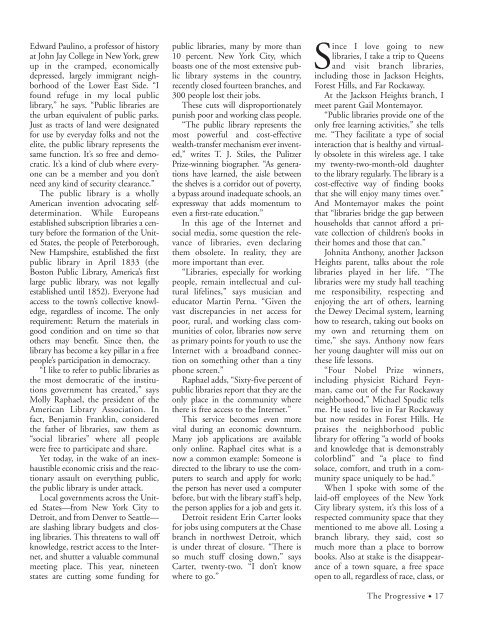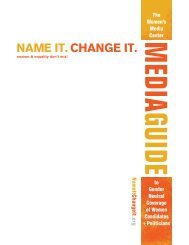Jodie Evans
Jodie Evans
Jodie Evans
Create successful ePaper yourself
Turn your PDF publications into a flip-book with our unique Google optimized e-Paper software.
Edward Paulino, a professor of history<br />
at John Jay College in New York, grew<br />
up in the cramped, economically<br />
depressed, largely immigrant neighborhood<br />
of the Lower East Side. “I<br />
found refuge in my local public<br />
library,” he says. “Public libraries are<br />
the urban equivalent of public parks.<br />
Just as tracts of land were designated<br />
for use by everyday folks and not the<br />
elite, the public library represents the<br />
same function. It’s so free and democratic.<br />
It’s a kind of club where everyone<br />
can be a member and you don’t<br />
need any kind of security clearance.”<br />
The public library is a wholly<br />
American invention advocating selfdetermination.<br />
While Europeans<br />
established subscription libraries a century<br />
before the formation of the United<br />
States, the people of Peterborough,<br />
New Hampshire, established the first<br />
public library in April 1833 (the<br />
Boston Public Library, America’s first<br />
large public library, was not legally<br />
established until 1852). Everyone had<br />
access to the town’s collective knowledge,<br />
regardless of income. The only<br />
requirement: Return the materials in<br />
good condition and on time so that<br />
others may benefit. Since then, the<br />
library has become a key pillar in a free<br />
people’s participation in democracy.<br />
“I like to refer to public libraries as<br />
the most democratic of the institutions<br />
government has created,” says<br />
Molly Raphael, the president of the<br />
American Library Association. In<br />
fact, Benjamin Franklin, considered<br />
the father of libraries, saw them as<br />
“social libraries” where all people<br />
were free to participate and share.<br />
Yet today, in the wake of an inexhaustible<br />
economic crisis and the reactionary<br />
assault on everything public,<br />
the public library is under attack.<br />
Local governments across the United<br />
States—from New York City to<br />
Detroit, and from Denver to Seattle—<br />
are slashing library budgets and closing<br />
libraries. This threatens to wall off<br />
knowledge, restrict access to the Internet,<br />
and shutter a valuable communal<br />
meeting place. This year, nineteen<br />
states are cutting some funding for<br />
public libraries, many by more than<br />
10 percent. New York City, which<br />
boasts one of the most extensive public<br />
library systems in the country,<br />
recently closed fourteen branches, and<br />
300 people lost their jobs.<br />
These cuts will disproportionately<br />
punish poor and working class people.<br />
“The public library represents the<br />
most powerful and cost-effective<br />
wealth-transfer mechanism ever invented,”<br />
writes T. J. Stiles, the Pulitzer<br />
Prize-winning biographer. “As generations<br />
have learned, the aisle between<br />
the shelves is a corridor out of poverty,<br />
a bypass around inadequate schools, an<br />
expressway that adds momentum to<br />
even a first-rate education.”<br />
In this age of the Internet and<br />
social media, some question the relevance<br />
of libraries, even declaring<br />
them obsolete. In reality, they are<br />
more important than ever.<br />
“Libraries, especially for working<br />
people, remain intellectual and cultural<br />
lifelines,” says musician and<br />
educator Martin Perna. “Given the<br />
vast discrepancies in net access for<br />
poor, rural, and working class communities<br />
of color, libraries now serve<br />
as primary points for youth to use the<br />
Internet with a broadband connection<br />
on something other than a tiny<br />
phone screen.”<br />
Raphael adds, “Sixty-five percent of<br />
public libraries report that they are the<br />
only place in the community where<br />
there is free access to the Internet.”<br />
This service becomes even more<br />
vital during an economic downturn.<br />
Many job applications are available<br />
only online. Raphael cites what is a<br />
now a common example: Someone is<br />
directed to the library to use the computers<br />
to search and apply for work;<br />
the person has never used a computer<br />
before, but with the library staff’s help,<br />
the person applies for a job and gets it.<br />
Detroit resident Erin Carter looks<br />
for jobs using computers at the Chase<br />
branch in northwest Detroit, which<br />
is under threat of closure. “There is<br />
so much stuff closing down,” says<br />
Carter, twenty-two. “I don’t know<br />
where to go.”<br />
Since I love going to new<br />
libraries, I take a trip to Queens<br />
and visit branch libraries,<br />
including those in Jackson Heights,<br />
Forest Hills, and Far Rockaway.<br />
At the Jackson Heights branch, I<br />
meet parent Gail Montemayor.<br />
“Public libraries provide one of the<br />
only free learning activities,” she tells<br />
me. “They facilitate a type of social<br />
interaction that is healthy and virtually<br />
obsolete in this wireless age. I take<br />
my twenty-two-month-old daughter<br />
to the library regularly. The library is a<br />
cost-effective way of finding books<br />
that she will enjoy many times over.”<br />
And Montemayor makes the point<br />
that “libraries bridge the gap between<br />
households that cannot afford a private<br />
collection of children’s books in<br />
their homes and those that can.”<br />
Johnita Anthony, another Jackson<br />
Heights parent, talks about the role<br />
libraries played in her life. “The<br />
libraries were my study hall teaching<br />
me responsibility, respecting and<br />
enjoying the art of others, learning<br />
the Dewey Decimal system, learning<br />
how to research, taking out books on<br />
my own and returning them on<br />
time,” she says. Anthony now fears<br />
her young daughter will miss out on<br />
these life lessons.<br />
“Four Nobel Prize winners,<br />
including physicist Richard Feynman,<br />
came out of the Far Rockaway<br />
neighborhood,” Michael Spudic tells<br />
me. He used to live in Far Rockaway<br />
but now resides in Forest Hills. He<br />
praises the neighborhood public<br />
library for offering “a world of books<br />
and knowledge that is demonstrably<br />
colorblind” and “a place to find<br />
solace, comfort, and truth in a community<br />
space uniquely to be had.”<br />
When I spoke with some of the<br />
laid-off employees of the New York<br />
City library system, it’s this loss of a<br />
respected community space that they<br />
mentioned to me above all. Losing a<br />
branch library, they said, cost so<br />
much more than a place to borrow<br />
books. Also at stake is the disappearance<br />
of a town square, a free space<br />
open to all, regardless of race, class, or<br />
The Progressive u 17



